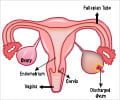Early diagnosis and management of premature ovarian insufficiency (POI) are essential for improving outcomes and quality of life by minimizing the risks associated with untreated POI.

Evidence-based guideline: premature ovarian insufficiency
Go to source).
‘Did You Know?
Approximately 4 percent of women worldwide are affected by premature ovarian insufficiency (POI). #womenhealth #POI #prematureovarianinsufficiency #medindia’





Approximately 4 percent of women worldwide are affected by premature ovarian insufficiency (POI). #womenhealth #POI #prematureovarianinsufficiency #medindia’
Advertisement
Premature Ovarian Insufficiency: Understanding Ovarian Function Loss Before 40
Premature ovarian insufficiency (POI) is defined as loss of ovarian function before 40 years. This is much earlier than the usual age of menopause; occurring at an average age of 48-51 years in women globally.Advertisement
POI: A Global Health Concern for 4% of Women
POI affects approximately 4 percent of women globally and is associated with infertility, psychological distress and an increased risk of osteoporosis, cardiovascular disease, mortality, dementia and cognitive dysfunction. While hormone therapy has been shown to mitigate some of these effects, the management of POI globally remains sub-optimal with delayed diagnosis, variation in care and patient dissatisfaction.The guidelines were last updated in 2015 and the 2024 update of the POI Guidelines of the European Society of Human Reproduction and Embryology (ESHRE), for the first time, involved an international partnership between ESHRE and the International Menopause Society, American Society for Reproductive Medicine and NHMRC-funded CRE-WHiRL, which is led by the Monash Centre for Health Research and Implementation (MCHRI), at Monash University.
From Awareness to Action: Tackling Premature Ovarian Insufficiency
The 2024 guidelines provide 145 recommendations on symptoms, diagnosis, causation, sequelae and treatment of POI. The recommendations were developed using the best available evidence and graded according to the strength of that evidence. Topics to cover in the guideline were informed by an international survey of women and healthcare professionals. New information is provided about the genetic causes of POI, the impact of POI on muscle health, use of anti-mullerian hormone, non-hormonal therapies, lifestyle interventions and complementary therapies.According to Co-Chair of the guideline development group, Associate Professor Amanda Vincent, from CRE-WHiRL, a key change of the updated 2024 guidelines is the recommendation regarding the diagnosis of POI; only one elevated follicle stimulating hormone (FSH) level is needed combined with irregular or absent menstrual periods for at least four months. The FSH level only requires repeating if the diagnosis remains unclear. Women with lived experience provided recommendations on how to convey the diagnosis and care of women with POI.
Why Early POI Diagnosis Matters
“The new Guideline means faster diagnosis of POI, conveyed in a sensitive manner and involving shared decision making between the healthcare professional and the woman experiencing POI,” said Associate Professor Vincent.A comprehensive clinical evaluation requires more than assessing symptoms, “it must also include asking a patient about her sexual wellbeing, fertility needs, psychological health, cardiovascular and osteoporosis risks, and co-morbidities,” she said.
Is Personalized Hormone Therapy Essential for POI?
The updated guideline stresses the importance of personalized hormone therapy, unless contraindicated, for symptom relief and chronic disease prevention; with the need for prompt institution and continuation until the usual age of menopause.“This provides healthcare professionals with the clear advice on best practice in POI care, based on the best evidence currently available,” Associate Professor Vincent said.
References:
- Evidence-based guideline: premature ovarian insufficiency - (https://www.tandfonline.com/doi/full/10.1080/13697137.2024.2423213)
Source-Eurekalert











